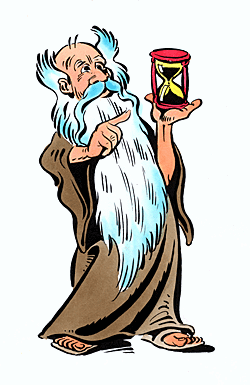2. The determined or customary moment when something begins or ends: "It is now time for dinner after which there will be time to watch our favorite TV program before it is time to go to bed."
3. One's experiences during a specific event: "We had a great time at the tea yesterday afternoon."
4. A period or length of apprenticeship, training, or military service: "He served his time in the naval reserve and he was glad that he had the experience."
"I still have time before I complete my internship at the hospital."
Spring is the time to plant thyme in the garden.

2. Any standard of time based on astronomical observations.
3. A system of time measurement formerly used by astronomers, based on solar time in a mean solar day beginning at noon, and superseded by civil time.
Such time is extremely important in tubes designed for ultrahigh frequencies.
2. A fuse; such as, the radio proximity fuse, set off by an electronic device incorporated within it.
A fuse that detonates a warhead when the target is within some specified region near the fuse.
Radio, radar, photoelectric, or other devices may be used as activating elements.
The strata of rock are classified according to their age, and a geological time scale corresponding to this can be constructed.
The main divisions (eras) are the Paleozoid, Mesozoic, and Cenozoic. These are further subdivided into periods and epochs.
Geological time refers to an interval of time occupied by the Earth's geologic history, extending from about 3.9 billion years ago (corresponding to the age of the oldest known rocks) to the present day.
In other words, it is the part of the Earth's history that is recorded in rock strata.
The geological time scale is classified in intervals distinguished by characteristic geological and biological features as indicated by the following longest to the shortest durations, eon (one thousand million years), era (divided into several periods), period (unit of geological time during which a system of rocks is formed), and epoch (geologic time that is a subdivision of a period).
2. Referring to a gas tube, the time interval between the initiation of conditions for and the establishment of conduction at some stated value of tube voltage drop.
An RFID tag that can be written to once and read many times (see WORM).
The Olympics is being shown during prime time on many television stations around the world.
Ultrasound scanning uses real-time control systems, making results available almost simultaneously with the generation of the input data.
To produce such an image, the data must be recorded quickly over a very short time rather than by accumulation over a longer period.
2. A system of measurement based on the position of the earth in relation to the sun.
Sometimes he feels like going jogging; however, in reality it is a sometime activity because he recently bought a new car. He promised his nephew that he would take him for a drive into town some time.
Algorithms are used to make sure the readers attempt to read tags at different times.
2. A lapse between the occurrences of events: Norbert passed the time waiting for the bus to arrive by reading and chatting with others who were waiting with him.
3. A manner, typically involving numbers that indicate when an event, etc. took place or may have taken place: Jane asked, "Jim, how much time has passed since we last got together?"
4. The indication of a period or interval of surrounding events: The past five years have been hard times for the factory.
5. An indication of when prevailing events or trends occur: By hiring a woman CEO, the organization was certainly in tune with the times.
6. Specific seasons or opportunities for events that take place: The village was celebrating harvest time by having a fair.
7. The occasion or opportunity in which to complete an activity: Mother said, "Mildred, there will be plenty of time to finish your homework."
8. An instance or specific occasion in which something happens: The time of little Glenda's birth was midnight on New Year’s Eve.
2.To make something happen at a certain minute: The senator timed his speech to take place just before the congressional recess was to take place for the summer.

Offer bright prospects to orthopedists.
Nostalgia is like a grammar lesson: A person often finds the present tense and the past perfect.
As a memory aid, I need ’em.
But they’d be more helpful later
If only I could read ’em.
That’s gaining increasing exposure;
Situations that formerly came to an end
Now have to be brought to closure.
We leave without apology.
Grown up, we swap kid stuff like you
For channeling and astrology.
All our computers are currently helping other customers.
May I transfer you to a person?
A black hole is a starcophagus.
Abstinence merits
Our consideration,
Practiced, of course,
In moderation.
I hope I do not live to see
The death of the apostrophe.
For readers all will suffer fits
In disentangling its from it's,
And they may also rave and rant,
Unable to tell cant from can't;
Not to mention how they feel
When they mix up well and we'll.
The term is often used in environmental chemistry to denote the length of time an ion or compound remains in the atmosphere or surface waters.
The sidereal time is a unit of time used in astronomy, equal to the period of time in which the Earth makes one rotation relative to the stars.
2. The time taken between successive meridian passages of the same star (23 hours, 56 minutes, 4.091 seconds): The sidereal day is about four minutes shorter than the twenty-four hours of the "solar day".

